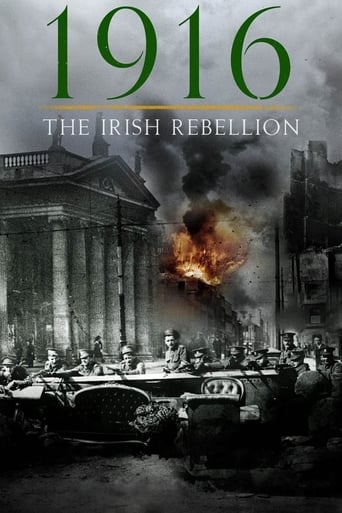Prismark10
As 2016 is the century anniversary of the Irish uprising this documentary has film star Liam Neeson narrating the events leading up to the Dublin Easter uprising of 1916.The interesting aspect is archival narrative from people or relatives of the people involved in the uprising. A first hand account from those that were present.The historical footage was mixed with contribution from academics who put into context as to why the Irish rebelled and what inspired it especially the French and American revolutions. Opinions from America was supportive of insurrection which had media support and carried details of the brutal revenge from the British authorities.The Irish rebellion was not at first popular, there were a lot of collateral damage, in short innocent bystanders died. However the harsh British response to the agitators added fuel to the flames.The Easter rebellion eventually led to the independence of Eire and later the independence of other colonies such as India. The programme was interesting if you knew nothing about the events.
rodger-hara
Nice use of historical footage but limited in scope with too many soaring shots of the River Liffey and seagulls. Stopped short of description of the War of Indepence and the Civil War, omitted reference to Francis Sheehy Skeffington whose murder also contributed to the rise of people's indignation against the British, made only passing reference to Michael Collins and his role and kept referring to what was then "Sackville Street" in 1916 as "O'Connell Street", a change that didn't occur until 1924 after signing of the Treaty. Agree with earlier review that encouraged a visit to the GPO Witness History exhibition - high tech/high touch in-depth presentation of the perspective of both sides. Touching new sculpture dedicated to the forty children who died in the Rising. Ticket price is ten Euro, not the two Euro earlier review cited.
l_rawjalaurence
Narrated by Liam Neeson, this documentary - either available as three parts or as an 85-minute long film - identifies the origins of the 1916 Rebellion in the independence movements of the late eighteenth century. Both the American War of Independence and the French Revolution helped lay the foundations for the desire for colonized nations to free themselves from the imperialist yoke and strike out on their own.In Ireland this spirit was fueled by the perception that the British government were not really interested in their welfare. This was especially evident during the Potato Famine of the 1840s and 1850s, when thousands of people died or emigrated to the United States. Once they arrived there, they were imbued by the "can-do" spirit, which helped them strengthen the movement towards independence.Ruan Magan's documentary told a familiar tale, one already retold in several programs broadcast to mark the 100th anniversary of the uprising. What distinguished it from others was its use of fascinating archive footage plus interviews with some of the protagonists who were actually there at the time. Listening to first-hand reminiscences made us aware of how the Rebellion was viewed: for the Irish Nationalists it represented a chance to assert themselves, but for ordinary citizens it was viewed as something of an unnecessary imposition, especially when so many people died as a result of the conflict.As with many documentaries, EASTER 1916 contained a slew of expert opinions from academics in Ireland, the United States, and Great Britain. While they offered trenchant and often articulate views, the overriding impression of this documentary was the importance of the Rebellion as a "bottom-up" revolt; the expression of the will of ordinary people. The British rulers' reaction - to execute all the leaders at the earliest possible opportunity - was perceived as excessive, and had the effect of increasing support for the rebels.The Rebellion was one of the first among Britain's colonies, and helped pave the way for independence movements worldwide. That represents its true significance historically; the event ushered in a new view of history where governments depended not on a foreign power but on the people themselves, who at last had the chance to choose their own rulers.
ericnottelling
For all those lovers of Ireland and Irish history. This is a doc done by the BBC. For the days leading up to the 1916 uprising. The video is worth a watch for sure if you don't already know the history. This covers the very beginning of it. The reason I have only given it a 7/10 is it doesn't go further into the story. It seems to end at the end of the uprising and give just a quick glance at how freedom for the Irish state was actually won some 5 years later. While the doc show some interesting older footage and give some historical context they seem to be hung up a lot on meaningless scenes of the ocean and repeating the same phrases and points over and over and over wait I don't know if the Irish horse is dead yet keep beating it again. There was a lot of filler time in this documentary. It could have either been shorter, or actually expanded the ending to give it some real closure than what it actually did. It would also be nice if they really dived into the history of the stories. They seem to just glance them. They could have also put forth effort into bringing in relevant modern connections. For anyone who has ever going to Dublin I would recommend a quick stop at the Post office on McConnel st. There is a museum inside dedicated to Irish independence and covers the story of the buildings role with the people who were inside it. It's 2 euro to get into the museum and probably the most educational 2 euro you will spend in Dublin. You will get your 2 euro worth.
